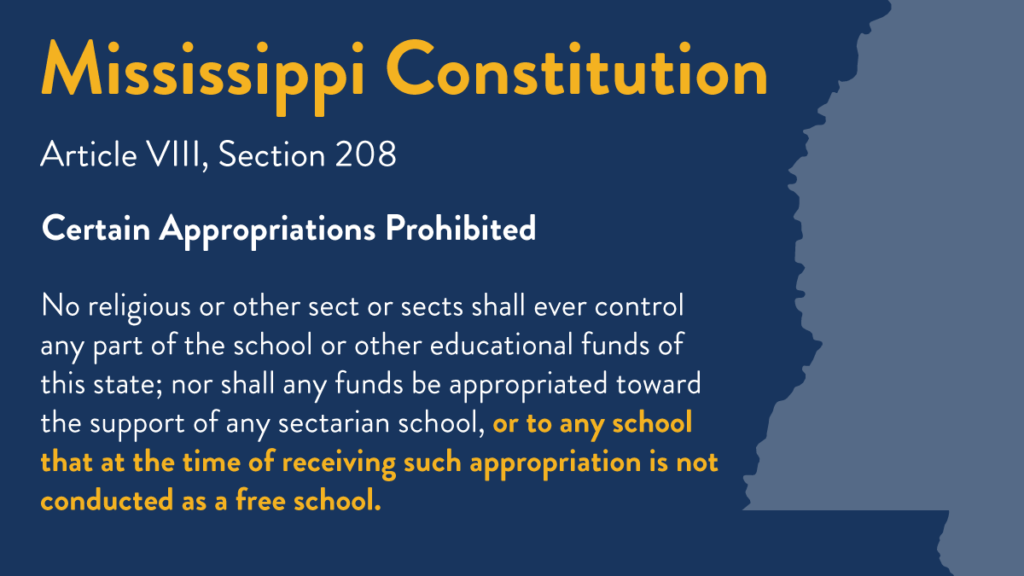The Mississippi Constitution is clear: taxpayer dollars may not be appropriated for private schools.
The authors of the State Constitution understood that strong public schools are unique in their contribution to the wellbeing of our communities and our state – and that the greatest threat to this vital common good is the siphoning of public funds to subsidize the private education of a few, creating a system of unequal schools that would divide and weaken our state. The details are laid out in an op-ed authored by our executive director, Nancy Loome. It is included below and has appeared in newspapers across the state.
Public Schools Essential to a Strong Mississippi
It’s no accident that corporate developers routinely consider the quality of local public schools when contemplating an expansion or relocation. Public schools provide the best indication of a community’s viability and quality of life.
More than 85 percent of Mississippi children are educated in our public schools, where Mississippi’s workforce, leaders, and future parents learn to read, write, solve problems, and get along with others. It is where they hone the intellectual, athletic, artistic, and technical skills that allow them to thrive.
Strong public schools increase property values, lower crime rates, attract well-paying jobs, and serve as community centers where we gather to work and play. They are our most valuable public good.
The authors of Mississippi’s Constitution recognized this – and that the greatest threat to this vital public good was the siphoning of public funds to subsidize the private education of a few, creating a dual system of unequal schools that would divide and weaken our state.
So strong was our forebears’ conviction that public funds should be reserved for only public schools – that do not limit access by charging tuition – that they enshrined this principle in the Mississippi Constitution, decreeing that no funds shall be appropriated to “any school that at the time of receiving such appropriation is not conducted as a free school.”
There is a move afoot to disregard this constitutional mandate and create a system of “school choice,” using public funds to pay tuition at private schools. It comes from national groups seeking to privatize, and help their corporate donors profit from, states’ education funding. Their strategy is to weaken support for public education by demonizing public schools and teachers, accusing them of “indoctrinating” students and casting aspersions on our neighbors who have made it their life’s work to educate, protect, and nurture our children.
The end goal of these privatizers is a taxpayer-funded system of private schools that operate under the radar, with no oversight by the taxpayers they want to have footing the bill.
The truth is that in a system of private school choice, it isn’t parents and children who have the power to choose. That power belongs to private schools, which are free to pick and choose the children they wish to enroll and to deny the others. Many of Mississippi’s children will not be chosen.
This is precisely what has happened with Mississippi’s ESA voucher program, which uses state funds to subsidize private school tuition for children with special needs. Of the 1,431 vouchers that have been doled out, from the program’s inception in 2015 through June of this year, only 522 have been used (source: Mississippi Department of Education). A Legislative PEER report revealed that parents didn’t use the vouchers because:
- Their children were denied admission to private schools
- They were unable to find a private school that met their children’s needs
- They couldn’t afford the tuition balance not covered by the voucher
A dual system of state-funded schools – with regulations for one but not the other, with one eligible for tuition plus state funding and the other restricted to only what the state provides – will keep Mississippi mired in the past, performing below her potential.
The strength of our local communities and our state relies on the state reserving its funding for schools that are held to a public standard, are publicly accountable, and are open to all children. The authors of our Constitution agreed, the public’s funds belong in the public’s schools.
###



